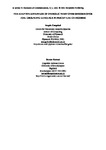The adaptive advantage of symbolic theft over sensorimotor toil: Grounding language in perceptual categories
| dc.contributor.author | Cangelosi, Angelo | |
| dc.contributor.author | Harnad, S | |
| dc.date.accessioned | 2015-10-13T21:13:04Z | |
| dc.date.available | 2015-10-13T21:13:04Z | |
| dc.date.issued | 2002-01-01 | |
| dc.identifier.issn | 1387-5337 | |
| dc.identifier.issn | 1569-9757 | |
| dc.identifier.uri | http://hdl.handle.net/10026.1/3619 | |
| dc.description.abstract |
Using neural nets to simulate learning and the genetic algorithm to simulate evolution in a toy world of mushrooms and mushroom-foragers, we place two ways of acquiring categories into direct competition with one another: In (1) "sensorimotor toil,” new categories are acquired through real-time, feedbackcorrected, trial and error experience in sorting them. In (2) "symbolic theft,” new categories are acquired by hearsay from propositions – boolean combinations of symbols describing them. In competition, symbolic theft always beats sensorimotor toil. We hypothesize that this is the basis of the adaptive advantage of language. Entry-level categories must still be learned by toil, however, to avoid an infinite regress (the “symbol grounding problem”). Changes in the internal representations of categories must take place during the course of learning by toil. These changes can be analyzed in terms of the compression of within-category similarities and the expansion of between-category differences. These allow regions of similarity space to be separated, bounded and named, and then the names can be combined and recombined to describe new categories, grounded recursively in the old ones. Such compression/expansion effects, called "categorical perception" (CP), have previously been reported with categories acquired by sensorimotor toil; we show that they can also arise from symbolic theft alone. The picture of natural language and its origins that emerges from this analysis is that of a powerful hybrid symbolic/sensorimotor capacity, infinitely superior to its purely sensorimotor precursors, but still grounded in and dependent on them. It can spare us from untold time and effort learning things the hard way, through direct experience, but it remain anchored in and translatable into the language of experience | |
| dc.format.extent | 117-142 | |
| dc.language | en | |
| dc.language.iso | en | |
| dc.publisher | John Benjamins Publishing Company | |
| dc.title | The adaptive advantage of symbolic theft over sensorimotor toil: Grounding language in perceptual categories | |
| dc.type | journal-article | |
| plymouth.issue | 1 | |
| plymouth.volume | 4 | |
| plymouth.publication-status | Published | |
| plymouth.journal | Evolution of Communication | |
| dc.identifier.doi | 10.1075/eoc.4.1.07can | |
| plymouth.organisational-group | /Plymouth | |
| plymouth.organisational-group | /Plymouth/Faculty of Science and Engineering | |
| plymouth.organisational-group | /Plymouth/Research Groups | |
| plymouth.organisational-group | /Plymouth/Research Groups/Institute of Health and Community | |
| plymouth.organisational-group | /Plymouth/Research Groups/Marine Institute | |
| dcterms.dateAccepted | 2002-01-01 | |
| dc.identifier.eissn | 1569-9757 | |
| dc.rights.embargoperiod | Not known | |
| rioxxterms.versionofrecord | 10.1075/eoc.4.1.07can | |
| rioxxterms.licenseref.uri | http://www.rioxx.net/licenses/all-rights-reserved | |
| rioxxterms.type | Journal Article/Review |


